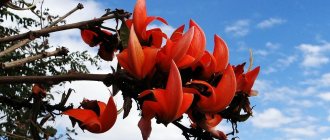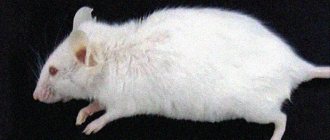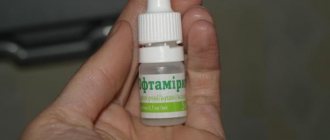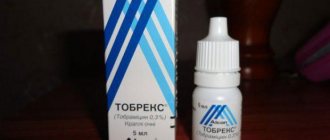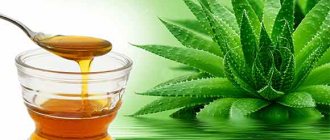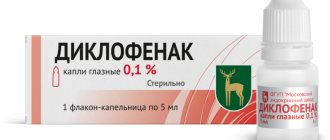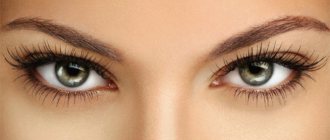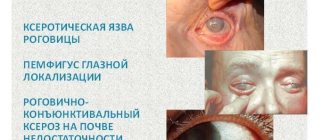Isotine eye drops are an Ayurvedic drug . These products are made in India.
And their main feature is that only natural plant ingredients are used for their production .
Such drugs have a complex effect , and although drops of this kind are not considered traditional medications, according to the patients themselves, they help well with many ophthalmological diseases.
General information and instructions for use
Isotine is used for the prevention and treatment of ophthalmological diseases of various origins and types - from dystrophic lesions of eye tissue to refractive errors (myopia and farsightedness).
It is worth noting! During the course of treatment, the beneficial effect of using such a remedy is observed from the first sessions of using the drops.
And the positive effect in the form of improved vision and slower development of pathologies persists for a long time.
The drug is recommended for use not only for therapeutic, but also for preventive purposes .
And even despite the fact that official medicine recognizes such means only as auxiliary.
In certain circumstances and in combination with other ophthalmic solutions, the use of isotin gives noticeable positive results.
Price
The main goal of Professor Basu, who patented eye drops, is to improve the vision of every person in the world, regardless of his financial status. Therefore, the price of Aisotin ophthalmic solutions is affordable even for the poorest people: in Russia it does not exceed 180 - 220 rubles. for 1 bottle of 10 ml.
The doctor has almost achieved his goal: every year sales volumes of this unique eye product increase in all countries, and more and more people using drops for preventive purposes maintain good vision into old age.
pharmachologic effect
Technically, such a product is a dietary supplement, which is made on the basis of Ayurvedic herbs.
Keep in mind! In the first five minutes after instillation, vision improvement is noted, and although this phenomenon is temporary, vision improves over time.
The practice of using isotin in patients with developing destructive processes in the tissues of the organs of vision shows that sometimes it is possible to cure pathologies in the initial stages without surgical intervention .
And this applies even to such serious diseases as cataracts.
Possible adverse reactions
The drug has been successfully used for 25 years, during which no cases of side effects have been reported. This indicates the safety and good tolerability of eye drops.
However, after instillation of Isotin, a temporary decrease in visual acuity and the appearance of fog before the eyes may be observed. To avoid this problem, it is recommended to choose glasses that have lenses of lower intensity.
Indications for use
Note! The scope of application of such a product is quite extensive - Isotin drops are indicated for the following pathological conditions and eye diseases:
- color blindness;
- eye fatigue that occurs for various reasons;
- glaucoma;
- pathological redness of the conjunctival membrane;
- retinitis;
- eye burns;
- macular degeneration;
- injuries of any origin;
- diabetic retinopathy;
- aphakia;
- amblyopia;
- conjunctivitis;
- any form of cataract.
The drug is also recommended as a preventive and restorative agent, which can be used after any ophthalmic surgery.
Mode of application
According to the instructions for use, as a therapeutic agent, Isotine should be instilled three times a day, two drops into each eye .
The recommended duration of treatment is from two weeks to a month , but for complex diseases, drops can be used for up to three months or longer.
For dry eye syndrome and increased fatigue of the visual organs, the drug can be instilled before bed, one drop at a time.
Such drops are not prescribed to children under 18 years of age due to the fact that clinical trials do not yet allow us to draw objective conclusions about the effectiveness or negative impact of such a drug on children’s visual organs.
Contraindications
Isotin eye drops have the only contraindication for use – the patient’s individual hypersensitivity to any component of the sterile solution. In such cases, the risk of developing a local allergic reaction increases.
Women who are pregnant or breastfeeding should use eye drops with caution. This is due to the lack of serious clinical studies among this category of patients. Therefore, the negative impact of the dietary supplement on the fetus and newborn cannot be completely excluded.
Analogues of Isotine
This product has no complete analogues, but there are drugs that act in a similar way, although they may differ significantly in composition:
- Quinax. Metabolic and anti-cataract agent used for any manifestations of this disease. The main active component of the drops is the compound azapentacene, which improves metabolic processes in eye tissues and protects lens cells from oxidative processes.
- Catalin . The drug stimulates the regenerative and protective properties of the lens and helps normalize the processes of glucose absorption. As a result, it is possible to prevent cloudiness in this element of the eye.
- Khrustalin . A drug of combined action that eliminates or slows down degenerative processes in the tissues of the lens. When using such drops, the development of myopia and cataracts slows down. Additionally, the solution has an antimicrobial, anti-inflammatory and moisturizing effect and relieves eye fatigue. At the same time, the life cycle of eyeball tissue cells is extended. Despite such effects that are observed in practice, the effectiveness of crystalline has not been officially confirmed, since it does not belong to medicinal solutions, but to cometary tonics.
- Emoxipin. A product from the category of angioprotectors that reduce the permeability and fragility of the blood vessels of the eye. The drug prevents the likelihood of hemorrhages in the organs of vision, has an antioxidant effect and helps normalize intraocular pressure. At the same time, it reduces blood viscosity and strengthens the walls of blood vessels.
- Ujala . The closest analogue of iceotin, which is an eye tonic and is used to improve vision and eliminate pathological processes in tissues without surgical intervention. With regular use, the product helps eliminate symptoms of chronic eye fatigue and eliminates redness of the conjunctiva. These symptoms may occur when working at a computer for a long time, due to wearing contact lenses, or due to ophthalmological diseases.
Isotine Plus eye drop (Aysotin Plus) - Ayurvedic eye drops
Ayurvedic eye drops Aisotin Plus from Jaggat Pharma to their patients! The product has a completely natural composition and is as highly effective as pharmaceutical eye drops produced in chemical laboratories, while Isotin Plus is completely safe and relatively inexpensive. Regular use of Isotin Plus will help to significantly improve vision; this is very important if you have to strain your eyes while working, for example, at the computer, and not only.
Ayurvedic eye drops Aisotin Plus are 100% safe, they can be used for glaucoma, cataracts, myopia, age-related farsightedness, amblyopia, retinitis, for physical eye injuries, and Aisotin Plus will also be useful during the period of postoperative vision restoration (including after eye surgery removal of the lens for cataracts), after laser surgery or surgery for retinal dissection, eye pressure. Drops relieve redness and fatigue of the eyes after working at the computer, relieve burns from ultraviolet radiation or electric welding.
These drops are used both symptomatically, for example, to relieve eye fatigue and relieve redness, and for more serious eye problems. In the latter case, the course of application should be long-term.
Aisotin Plus differs from classic Aisotin drops in its more powerful effect, thanks to which severe disorders can be dealt with in a fairly short time.
Purpose:
- glaucoma,
- cataracts (including senile and underdeveloped),
- colorblindness,
- myopia, age-related farsightedness,
- amblyopia,
- retinitis,
- physical eye injuries
- postoperative restoration of vision (including after operations to remove the lens for cataracts), after laser operations or operations for retinal dissection,
- eye pressure,
- redness and fatigue of the eyes after working at the computer,
- burns from ultraviolet radiation or electric welding.
Active components:
Amla - helps improve vision, prevents the occurrence of age-related eye diseases, glaucoma, cataracts, helps reduce intraocular pressure, relaxes and soothes the muscles and membranes of the eyeball.
Punarnava is one of the golden series plants of Ayurveda, in Sanskrit “punarnava” literally means “new again”. Has antioxidant and anti-inflammatory effect. Reduces pain in the eye area, reduces tear production, improves metabolic processes and nourishes cells, has astringent, hemostatic and healing properties. Slows down the development of cataracts.
Bibhitaki is a well-known anti-aging plant and is part of Triphala. Improves vision. has anti-inflammatory and antibacterial properties.
Yashad bhasma is a specially processed zinc powder. The refrigerant is used in the treatment of eye diseases and has wound-healing properties.
Tankana bhasma is a specially processed borax powder (sodium pyroborate). Has antibacterial and wound-healing properties.
Tuth bhasma is purified copper sulfate. Antiseptic and astringent, used for the treatment and prevention of infectious diseases.
Sphatika Bhasma is a purified alum stone that has wound healing properties.
Instructions for use: 2 times a day, 2 drops in each eye. Course – 3 months. For serious illnesses, the course can be 6 months. The drug has no age restrictions. It is advisable to use an open bottle within a month. Store in a cool, dry, dark place.
Composition: Holostemm ada-codien - 0.3%, White sandalwood (Santalum album) - 0.3%, Bibhitaki (Terminalia belerica) - 0.3%, Amla (Emblica officinalis) - 0.3%, Butea monosperma - 0.3%, Apamarga (Achyranthes aspera) - 0.3%, Punarnava (Boerhavia diffusa) - 0.3%, Yashad Bhasma - 0.06%, Tankana Bhasma - 2%, Sphatika Bhasma (Alum) - 0.4% , Tuth Bhasma (Cuprum) - 0.04%, Peppermint (oil) (Mentha pipreta) - 0.015%, Benzalkonium Chloride - 0.01%, Water (Aqua) - 10 ml.
Volume: 10 ml
Isotine Plus eye drop (Aysotin Plus) - Ayurvedic eye drops
Additional recommendations for using the product
It should be remembered that Isontine is a dietary supplement.
Drops do not have proven and officially confirmed therapeutic properties.
Therefore, it is necessary to use drops in conjunction with traditional remedies prescribed by the attending physician .
People who wear contact lenses must remove their optics before instilling iceotin and put them on only 15-20 minutes after instillation, since contact with this solution may cause the lenses to become cloudy.
special instructions
Isotin eye drops are classified as dietary supplements; the product is not a drug. There are no data on the interaction of Ayurvedic plants with other medicines. Cases of overdose with eye drops have not been described.
The product must be stored in a place where children do not have access. The temperature in the room should not exceed 250 C. The shelf life of Isotin is 2 years, but after opening the dropper bottle, the drops can only be used for 28 days.
During instillation, any contact of the tip of the Isotin bottle with the eye or other objects should be avoided. This will prevent contamination of the sterile solution and infection of the eye tissue. If the patient wears soft contact lenses, they must be removed before administering eye drops.
Reviews
“I heard about iceotine from friends, and not long ago I had to try the effect of these drops on myself, as my eyes began to water and turn red after working at the computer .
The drug coped well with inflammation.
And although cheaper drops can be used to eliminate fatigue and irritation in such cases, iceotin has the advantage of also providing a therapeutic effect .”
Roman Agarkov, Nizhnekamsk.
“My wife and I use Isotin drops in our family : we both have myopia.
And these drops are perfect for preventive and therapeutic use .
A month and a half after starting to use these drops, I noticed that the noticeable and rapid deterioration of vision had stopped .
I hope that the continued use of drops will not only slow down the development of pathology, but also stop it completely.”
Petr Makarov, Kostroma.
Analogs
All Ayurvedic remedies are unique; they have no analogues, much less generics. Even Isotin Plus, according to the manufacturer, is a continuation of Isotin, and not a substitute. The main disadvantage of all Indian products is that they are not sold in regular retail pharmacies. Most often, you need to order funds and wait for the package to arrive.
An ophthalmologist, who, in addition to his main specialty, is well versed in homeopathy, will be able to select a remedy that is similar in composition and mechanism of action. Pharmacy analogues of “Isotin” drops:
- "Taufon";
- "Igrel";
- "Emoxipin";
- "Katalin";
- "Quinax";
- "Ujala";
- "Khrustalin".
The listed drugs are medications and should be taken under the supervision of a doctor.
